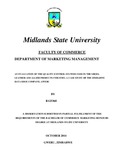Please use this identifier to cite or link to this item:
https://cris.library.msu.ac.zw//handle/11408/2904| Title: | An evaluation of the quality control systems used in the shoes, leather and allied products industry: a case study of the Zimbabwe Bata Shoe Company, Gweru | Authors: | Gombe, Charles | Keywords: | Employee participation Quality control |
Issue Date: | 2014 | Publisher: | Midlands State University | Abstract: | This research was undertaken to evaluate the quality control system used by The Zimbabwe Bata Shoe Company Gweru. The study was motivated by challenges that the company is facing particularly in its School shoe category which include loss in market share, decline in sales volumes and increase in the amount of rejects. The main objectives of the study were to establish the factors causing the major quality problems in the school shoes category. Moreover the study also sought to investigate the impact of worker participation on improving the quality of school shoes. Finally it also sought to establish the effect of Bata’s financial reward system on quality of productivity. Various literatures in the area of quality control as well as employee participation and the reward system were reviewed and most of it came from textbooks, journals and other online resources. The research design used for this study was a combination of exploratory and descriptive research. The major instruments of the study were questionnaires and interviews which yielded both qualitative and quantitative data. In terms of data analysis both qualitative and quantitative approaches were used. The study found out that major causes of quality problems at Bata shoe manufacturing company are poor raw materials, lack of skilled personnel, power outages, water shortages and old machinery. Majority of respondent’s interview indicated that the company has adequate control mechanisms in place for ensuring raw materials, processes and the final product meets the accepted standards. Employee participation at Bata Shoe Company has an impact on improving quality of products as it emerged that managers are reluctant to implement views of employees and is done informally, not planned and is not given adequate time. The study revealed that rewards systems have a positive impact on quality of productivity. The study recommends the company to consider horizontal collaboration with suppliers and also improving on employee participation. | URI: | http://hdl.handle.net/11408/2904 |
| Appears in Collections: | Bachelor Of Commerce Marketing Management Honours Degree |
Files in This Item:
| File | Description | Size | Format | |
|---|---|---|---|---|
| Charles Gombe-DISSERTATION.pdf | Full Text | 1.03 MB | Adobe PDF |  View/Open |
Page view(s)
258
checked on Feb 26, 2025
Download(s)
188
checked on Feb 26, 2025
Google ScholarTM
Check
Items in MSUIR are protected by copyright, with all rights reserved, unless otherwise indicated.


